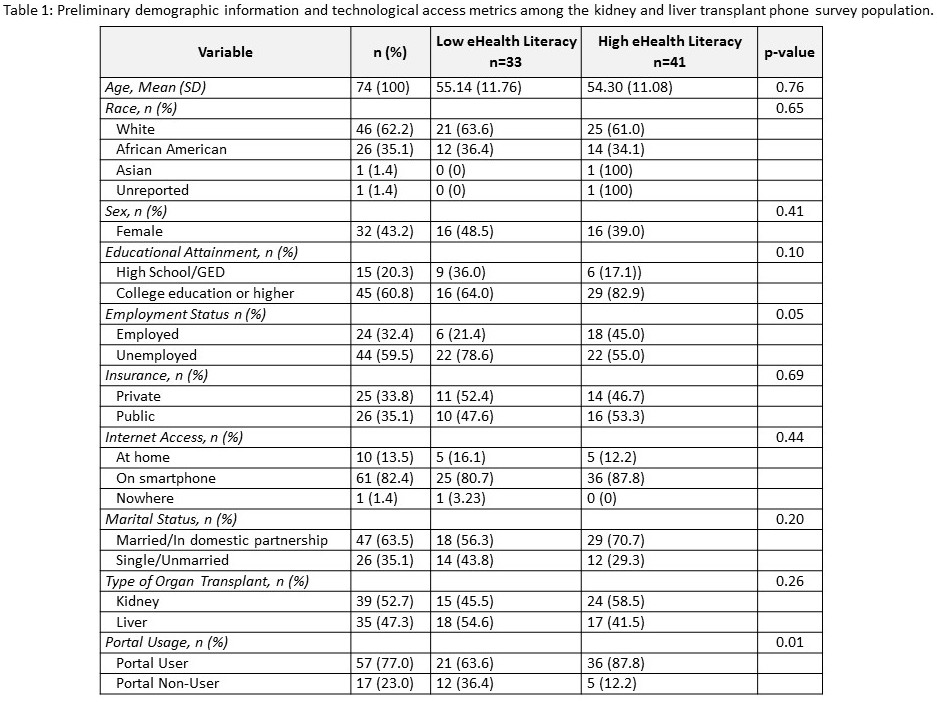eHealth Literacy and Patient Portal Utilization Among Transplant Recipients.
K. Smith, A. Ruiz, J. Wedd, S. Pastan, R. Parker, R. Patzer.
Emory Transplant Center, Atlanta, GA
Meeting: 2017 American Transplant Congress
Abstract number: C248
Keywords: Kidney transplantation, Liver transplantation
Session Information
Session Name: Poster Session C: Psychosocial and Treatment Adherence
Session Type: Poster Session
Date: Monday, May 1, 2017
Session Time: 6:00pm-7:00pm
 Presentation Time: 6:00pm-7:00pm
Presentation Time: 6:00pm-7:00pm
Location: Hall D1
Background: Healthcare systems are required to engage patients with web-based patient portals. eHealth literacy is a distinct type of health literacy needed to properly understand information presented in the portal. Our research aims were 1) to describe eHealth literacy among a population of kidney transplant (KTx) and liver transplant (LTx) recipients, and 2) to investigate the relationship between eHealth literacy and portal use.
Methods: We administered a phone survey to adult KTx or LTx recipients who received transplants from March 2014 – March 2016. eHealth literacy was collected in the survey using the validated, 8-item eHEALS scale. Each question was worth 1-5 points, and an overall eHealth Literacy score was obtained by averaging the total score by the number of items. We clustered eHealth literacy into low and high groups by dichotomizing at the mean (3.77). Portal use was self-reported in the survey as yes or no. Demographic variables were obtained from survey and clinical data. Multivariable logistic regression was performed to assess the relationship between eHealth literacy and portal use.
Results: Among 74 patients (37% of target enrollment) who completed the survey thus far, 41 patients (55%) had high eHealth literacy. Among high eHealth literacy recipients, the average age was 54 years, 40% were female, 53% had public insurance, 83% attended college, and 59% were KTx recipients.  Multivariable logistic regression adjusted for type of organ transplant, age, and race showed a strong association between high eHealth literacy and portal usage (OR: 4.0, 95% CI: 1.04, 15.24). In addition, 43% of all patients reported in eHEALS that they struggled to differentiate a health information source as high or low quality, and 52% did not feel confident using Internet information to make health decisions.
Multivariable logistic regression adjusted for type of organ transplant, age, and race showed a strong association between high eHealth literacy and portal usage (OR: 4.0, 95% CI: 1.04, 15.24). In addition, 43% of all patients reported in eHEALS that they struggled to differentiate a health information source as high or low quality, and 52% did not feel confident using Internet information to make health decisions.
Conclusions: Preliminary analyses show that KTx and LTx recipients with high eHealth literacy are more likely to use a patient portal. To increase portal use among all transplant recipients, portals must be tailored to those with lower eHealth literacy to give patients a coherent, reliable source of information about the complex transplant condition.
CITATION INFORMATION: Smith K, Ruiz A, Wedd J, Pastan S, Parker R, Patzer R. eHealth Literacy and Patient Portal Utilization Among Transplant Recipients. Am J Transplant. 2017;17 (suppl 3).
To cite this abstract in AMA style:
Smith K, Ruiz A, Wedd J, Pastan S, Parker R, Patzer R. eHealth Literacy and Patient Portal Utilization Among Transplant Recipients. [abstract]. Am J Transplant. 2017; 17 (suppl 3). https://atcmeetingabstracts.com/abstract/ehealth-literacy-and-patient-portal-utilization-among-transplant-recipients/. Accessed March 3, 2026.« Back to 2017 American Transplant Congress
